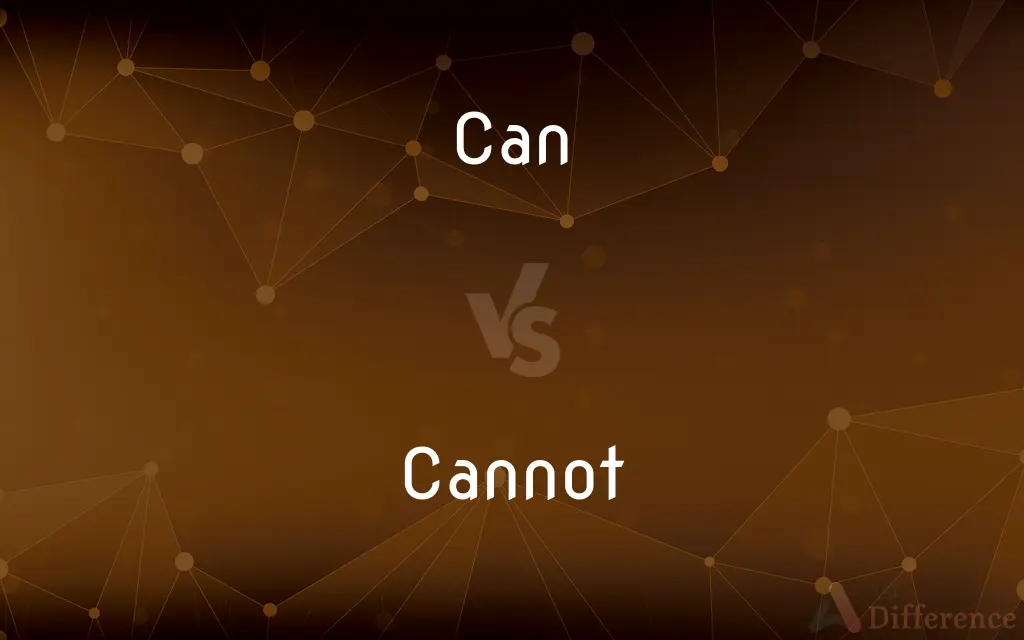Can vs. Cannot — What's the Difference?
By Tayyaba Rehman & Fiza Rafique — Published on February 19, 2024
"Can" indicates the ability or possibility to do something. "Cannot" (or "can't") signifies the inability or impossibility to perform an action.

Difference Between Can and Cannot
Table of Contents
ADVERTISEMENT
Key Differences
The words "can" and "cannot" are modal verbs in English, used to express ability, permission, or possibility. "Can" is used to indicate that someone has the ability to do something or that circumstances make something possible or permissible. For example, saying "I can swim" implies the speaker has the ability to swim.
On the other hand, "cannot," the negated form of "can," indicates the absence of ability, permission, or possibility. It is used to express that someone does not have the ability to do something, or certain circumstances make an action impossible or not allowed. For instance, "I cannot swim" clearly states that the speaker lacks the ability to swim.
The distinction between these two terms is fundamental in English, as it changes the meaning of sentences from affirmative to negative. Using "can" suggests a positive outcome or possibility, while "cannot" introduces a limitation or restriction.
In addition to expressing ability, "can" and "cannot" are also used to ask for or give permission. "Can I leave early today?" is a request for permission, whereas "You cannot park here" denies permission.
Understanding when to use "can" and "cannot" is crucial for effective communication, as it helps to clearly convey whether actions are feasible or permissible under certain conditions.
ADVERTISEMENT
Comparison Chart
Meaning
Indicates ability or possibility.
Indicates lack of ability or impossibility.
Usage
To express what is possible or allowed.
To express what is not possible or not allowed.
Example
"I can speak Spanish."
"I cannot speak French."
Permission
Used to ask for or give permission.
Used to deny permission.
Negation
Affirmative form.
Negative form.
Compare with Definitions
Can
Offers assistance.
Can I help you with that?
Cannot
Refuses permission.
You cannot enter without a ticket.
Can
Suggests availability.
The manager can meet you tomorrow.
Cannot
Indicates impossibility.
We cannot see the stars due to clouds.
Can
A usually cylindrical metal container.
Cannot
Highlights restrictions.
You cannot park in this area.
Can
An airtight container, usually made of tin-coated iron, in which foods or beverages are preserved.
Cannot
Denies ability.
He cannot lift that heavy box.
Can
The contents of such a container
Ate a can of beans.
Cannot
Expresses lack of skill.
I cannot play the piano.
Can
(Slang) A jail or prison.
Cannot
Can not (be unable to).
I cannot open the window. It is stuck.
Can
(Slang) A toilet or restroom.
Cannot
Be forbidden or not permitted to
You cannot enter the hall without a ticket.
Can
(Slang) The buttocks.
Cannot
Something that cannot be done.
The cans and cannots
Can
(Slang) A naval destroyer.
Cannot
A person who cannot do (something).
Can
To seal in an airtight container for future use; preserve
Canning peaches.
Cannot
Am, is, or are, not able; - written either as one word or two.
Can
(Slang) To make a recording of
Can the audience's applause for a TV comedy show.
Can
To end the employment of; fire.
Can
To put an end or stop to
Canned the TV show after one season.
Told the students to can the chatter.
Can
To solicit cash donations for a charity or other organization such as a club or amateur sports team by holding out a can or other container in a public place.
Can
To know how to; to be able to.
She can speak English, French, and German.
I can play football.
Can you remember your fifth birthday?
Can
May; to be permitted or enabled to.
You can go outside and play when you're finished with your homework.
Can I use your pen?
Can
(modal auxiliary verb, defective) To have the potential to; be possible.
Can it be Friday already?
Teenagers can really try their parents' patience.
Animals can experience emotions.
Can
Used with verbs of perception.
Can you hear that?.
I can feel the baby moving inside me.
Can
To know.
Can
To seal in a can.
They canned air to sell as a novelty to tourists.
Can
To preserve by heating and sealing in a jar or can.
They spent August canning fruit and vegetables.
Can
To discard, scrap or terminate (an idea, project, etc.).
He canned the whole project because he thought it would fail.
Can
To shut up.
Can your gob.
Can
To fire or dismiss an employee.
The boss canned him for speaking out.
Can
To hole the ball.
Can
(transitive) To cover (the fuel element in a nuclear reactor) with a protective cover.
Can
A more or less cylindrical vessel for liquids, usually of steel or aluminium, but sometimes of plastic, and with a carrying handle over the top.
Can
A container used to carry and dispense water for plants (a watering can).
Can
A tin-plate canister, often cylindrical, for preserved foods such as fruit, meat, or fish.
Can
A chamber pot, now a toilet or lavatory.
Shit or get off the can.
Bob's in the can. You can wait a few minutes or just leave it with me.
Can
Buttocks.
Can
(slang) Jail or prison.
Bob's in the can. He won't be back for a few years.
Can
Headphones.
Can
(archaic) A drinking cup.
Can
(nautical) A cube-shaped buoy or marker used to denote a port-side lateral mark
Can
A chimney pot.
Can
An E-meter used in Scientology auditing.
Can
An ounce (or sometimes, two ounces) of marijuana.
Can
A protective cover for the fuel element in a nuclear reactor.
Can
An obs. form of began, imp. & p. p. of Begin, sometimes used in old poetry. [See Gan.]
With gentle words he can faile gree.
Can
A drinking cup; a vessel for holding liquids.
Fill the cup and fill can,Have a rouse before the morn.
Can
A vessel or case of tinned iron or of sheet metal, of various forms, but usually cylindrical; as, a can of tomatoes; an oil can; a milk can.
Can
To preserve by putting in sealed cans
Can
To know; to understand.
I can rimes of Rodin Hood.
I can no Latin, quod she.
Let the priest in surplice white,That defunctive music can.
Can
To be able to do; to have power or influence.
The will of Him who all things can.
For what, alas, can these my single arms?
Mæcænas and Agrippa, who can most with Cæsar.
Can
To be able; - followed by an infinitive without to; as, I can go, but do not wish to.
Yet he could not but acknowledge to himself that there was something calculated to impress awe, . . . in the sudden appearances and vanishings . . . of the masque
Tom felt that this was a rebuff for him, and could not but understand it as a left-handed hit at his employer.
Can
Airtight sealed metal container for food or drink or paint etc.
Can
The quantity contained in a can
Can
A buoy with a round bottom and conical top
Can
The fleshy part of the human body that you sit on;
He deserves a good kick in the butt
Are you going to sit on your fanny and do nothing?
Can
A plumbing fixture for defecation and urination
Can
A room equipped with toilet facilities
Can
Preserve in a can or tin;
Tinned foods are not very tasty
Can
Terminate the employment of;
The boss fired his secretary today
The company terminated 25% of its workers
Can
Expresses ability.
She can solve complex equations.
Can
Asks for permission.
Can I use your phone?
Can
Indicates possibility.
We can see the stars tonight.
Common Curiosities
Can "can" be used to express future possibilities?
Yes, it often indicates future potential or ability.
Is "can't" the same as "cannot"?
Yes, "can't" is a contraction of "cannot."
Can "can" be replaced with "able to"?
Often, but not always, especially in modal questions and permissions.
How do "can" and "cannot" affect sentence mood?
"Can" adds a positive or hopeful tone, while "cannot" introduces negativity or limitation.
Is the use of "cannot" in instructions common?
Yes, especially to emphasize prohibitions or restrictions.
Are there exceptions to the rules for "can" and "cannot"?
Usage can vary in colloquial speech, but standard rules apply in formal writing.
Is "cannot" always negative?
Yes, it negates the ability or possibility mentioned.
Can "can" be used for formal requests?
Yes, though "may" is often preferred in formal contexts.
How does context affect the use of "can" and "cannot"?
The meaning can shift slightly depending on context, especially between permission and ability.
How do "can" and "cannot" function in a question?
"Can" asks if something is possible or permissible, while "cannot" is less common in questions.
Can "cannot" be emphasized further?
Yes, phrases like "absolutely cannot" or "cannot under any circumstances" add emphasis.
Why is it important to use "can" and "cannot" correctly?
To accurately express ability, possibility, and permission, avoiding misunderstandings.
Can "cannot" be used to express doubt?
Typically, "cannot" is more about impossibility than doubt; "may not" is used for doubt.
Do "can" and "cannot" have the same root?
Yes, "cannot" is simply the negative form of "can."
How does the use of "can" and "cannot" vary in legal documents?
Legal texts may prefer "may" and "may not" for permissions, with "can" and "cannot" indicating ability.
Share Your Discovery

Previous Comparison
Oculus Rift vs. Gear VR
Next Comparison
Xvid vs. H.264Author Spotlight
Written by
Tayyaba RehmanTayyaba Rehman is a distinguished writer, currently serving as a primary contributor to askdifference.com. As a researcher in semantics and etymology, Tayyaba's passion for the complexity of languages and their distinctions has found a perfect home on the platform. Tayyaba delves into the intricacies of language, distinguishing between commonly confused words and phrases, thereby providing clarity for readers worldwide.
Co-written by
Fiza RafiqueFiza Rafique is a skilled content writer at AskDifference.com, where she meticulously refines and enhances written pieces. Drawing from her vast editorial expertise, Fiza ensures clarity, accuracy, and precision in every article. Passionate about language, she continually seeks to elevate the quality of content for readers worldwide.














































